Property title transfer
Transferring Property to an LLC
Some choose to transfer property to an LLC to help limit their personal liability, especially if they own commercial or rental properties. Those who own multiple properties usually form an LLC for each property to protect the properties from each other in liable situations. If you have not yet formed an LLC, we can help you Start an LLC. If you are carrying a mortgage on the property, the first step to beginning the process is to contact your lender. Your lender can guide you through the process of transferring the property and the associated mortgage.
Once the process is complete, you'll want to update your active lease agreements with your tenants.
Using Quitclaim Deed
A Quitclaim Deed is most often used when both parties know each other well since it provides minimal protection for the party receiving the "interest." A Quitclaim Deed documents that someone has given up interest in a property. In most cases, the property is owned outright. It can be used to transfer property from:
- One spouse to a spouse or ex-spouse
- One family member to another as a gift
- An individual or entity to a trust
- One name to another after a legal name change
- An individual to a business or other type of entity
- An individual to another to resolve a "cloud" on the title
Transferring Property to a Trust
Transferring property to a trust is often not difficult and can be completed using a deed transfer. You can use a QuitClaim Deed if there are no known title issues, or a Warranty Deed if you want to ensure there are no issues with the title. If the property is mortgaged, ask your lender what would happen if you transfer the property to a trust. Sometimes you have to pay off the mortgage to transfer the property, especially if the property is not being transferred to a family trust.
Transferring Property to a Family Member
In most cases, you can transfer property to a family member using a Quitclaim Deed or a Warranty Deed. It is not difficult, but there may be tax implications you'll want to explore before you transfer the property. Your accountant can explain possible tax issues such as gift taxes. In some situations, it may even be more beneficial to transfer property to a family trust rather than to one family member. While the actual paperwork to transfer property is simple, you'll want to discuss the topic with an estate lawyer and your accountant before transferring expensive property.
Cost to Transfer a Property Title
Obtaining a Quitclaim Deed or a Warranty Deed is simple and low-priced. We can provide the initial paperwork as part of your membership. Other expenses may include:
- Title insurance
- Filing fee with the local county recorder
- Notary public fee
- Lawyer fees
Buying or selling real estate
Need of a Lawyer to BUY or SELL Property
Many would answer yes to that question. Some states and regions may even require that a lawyer help with closing. While you may not always need a lawyer for simple real estate transactions, you may benefit from hiring an attorney to help you with more complicated sales. Examples of types of sales that you may need a lawyer for include buying property in other states, bank sales, buying commercial property, buying from an estate sale, or buying damaged property. If the real estate transaction is not complicated, and your state does not require you to hire a lawyer, your agent should be able to guide you through the process.
Offering Renter from Lease to Own Option
If your property is located in an area that is difficult to sell in, and your renters have expressed interest in renting to own, it may not be a bad option for you. Offering them this option will still allow you to collect regular rents until when/if they choose to use their option. If you have no interest in selling the property in the next couple of years, then there may be no advantage to offering a Lease to Own Agreement.
Lease to Own Agreement advantages for sellers:
- Maintain monthly rental income
- You can keep the option fee even if they choose not to buy
- In most agreements, premiums also do not need to be refunded
- You can lock in the purchase price
- Leaseholder may be more incentivized to maintain the property
Things to know about Buying a Foreclosed Property
Buying foreclosed homes is an attractive option for investors since it gives you the chance to potentially purchase property at a below-market rate; however, it can be risky. You may have to bid on a property you don't get to inspect. In some cases, you may need cash to purchase if you cannot get a conventional loan on the property.
If you plan on purchasing foreclosed properties, you should do plenty of research on how to increase the odds in your favor. You should consider researching the following areas:
- How best you can obtain financing
- The going market values in the area you intend to buy in
- The best inspectors and repair persons in your area
- How to research property histories
Real Estate Financing
-
Buying Real Estate without Down Payment
Despite what you may have heard, you can buy a home without a down payment or with a small down payment. If you have good credit but minimal savings, you may consider:
- First time buyers programs: These programs may be supported by your city or a local housing agency and may pay your down payment for you. Some programs may only require you to pay a few hundred of your own money down.
- FHA loan: These loans are available to U.S. citizens and residences and only require you to pay 3.5 percent down. Accepted credit scores are also lower than traditional bank loans.
- VA loan: These loans are available without a down payment and do not require private mortgage insurance. Current military members, veterans, reservists, and National Guard members may qualify for this loan. You may consider seeing if you qualify for a Navy Federal loan as well.
-
Owner Financing
Owner financing is when the owner of a property finances the purchase of the property rather than a bank or traditional mortgage company. Terms are usually flexible since the owner and buyer can agree on what terms are suitable. The owner may choose to finance the entire purchase price or part of it. In most cases, owner financing is not the best option for the seller; however, in a buyer's market, it may be a better option than not being able to sell the property at all.
-
Get a Mortgage with Bad Credit
You can obtain a loan with marginal credit, but the terms may not be the best. You might have to pay a higher interest rate and/or put down a larger down payment. Plus, you'll need to prove that your income earning potential is sufficient to make the payments. If your credit score is over 600, you might even be able to obtain a traditional mortgage. FHA and USDA loans do not require a high credit score.
-
Advantages of Purchasing Commercial Property
You may be considering investing in commercial property rather than or in addition to residential properties. There are some distinct advantages to investing in commercial real estate such as:
- More lenient lease terms. You are not subject to restrictive housing requirements.
- Triple net leases. Basically, a triple net lease means that the renter pays for everything, including building maintenance and property taxes.
- Shorter hours of operation. Depending on the business, you are not likely to get a two a.m. phone call you have to respond to. In most cases, you can manage the property during standard business hours.
- Longer leases. Often commercial leases are for three to five years, or even longer.
- Tax advantages. Business property allows some advantageous tax deductions. Your accountant can help you navigate taxes related to your commercial properties.


 +91 95358 58289
+91 95358 58289